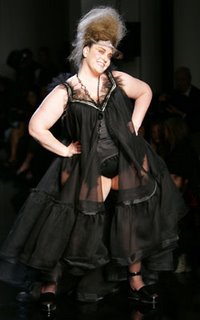Literary Heroes Day
What a fucking great day!
(More on this later, maybe; for now I must nurse a headache and take my kid trick-or-treating.)
Author Randa Jarrar's Blog
Arab Name Substitution happens a lot, too. The premise here is that a name is too difficult to pronounce, so rather than butcher it or even make an attempt, the original is dropped for a new and improved version.
Some examples:
Mike = Mohammed
Charlie = Khalil
Abe = Abdul
Ed = Ahmad
This is an equal opportunity name game.
Sue = Saada
Jamie = Jamila
And my personal favorite:
Babbette = Ibtisam
...
Mispronouncing, on the other hand...is it really that hard? I’ve been called “High-on,” “High-yeen,” “Chai-yon,” “Ha-non,” and, technically a mispronunciation, “Hasan.”
It could be worse, I suppose. I could have an African name. A friend from high school was named Abiyamifalukemenarakuma. African names seem to get it worse than Arabic names. On top of mispronouncing, misspelling, substituting, and getting it all wrong, they get edited too. Most of my high school classmates just cut out the last twenty letters of Abiyamifalukemenarakuma’s name.
Abi.
That’s a girl’s name. That’s a coming-of-age-1980s-movie-girl-actor-name. That’s hardly a beautiful African name.
Did Pamuk receive the award in his capacity as an alternative to an Armenian writer? Has the game of doppelgangers and the interlocking of identities now overtaken the novelist himself, turning him into the hero of a novel he did not write? The game of the writer's transformation into the hero of a novel he has not penned fascinates me because it is one of the signs of the text's revenge on the writer who considers that his intelligence allows him to pass over the very chalice he has given to the heroes of his novels to drink. Was this not the fate of Salman Rushdie, Kafka and Emile Habiby, among others?Read it here.
 |
| 'What will your obituary say?' at QuizGalaxy.com |
INTERVIEWERI love this! In reacting against writers who come before, one may be able to produce fiction that has, say, social significance, or critique, or whatever their writing lacked.
Were you ever interested in doing social commentary through literature?
PAMUK
No. I was reacting to the older generation of novelists, especially in the eighties. I say this with all due respect, but their subject matter was very narrow and parochial.
INTERVIEWERDamn! To spill his guts out about his brother like that, with such an astute level of self-analysis, is indicative of one hell of a generous mind. But to compare his relationship with his brother to that between Turkey and the West, and then to take it further and talk about "the imitative drive"... so good, so right-on.
... What inspired you to write The White Castle? It’s the first book where you employ a theme that recurs throughout the rest of your novels—impersonation. Why do you think this idea of becoming somebody else crops up so often in your fiction?
PAMUK
It's a very personal thing. I have a very competitive brother who is only eighteen months older than me. In a way, he was my father, —my Freudian father, so to speak. It was he who became my alter ego, the representation of authority. On the other hand, we also had a competitive and brotherly comradeship. A very complicated relationship. I wrote extensively about this in Istanbul. I was a typical Turkish boy, good at soccer and enthusiastic about all sorts of games and competitions. He was very successful in school, better than me. I felt jealousy towards him, and he was jealous of me too. He was the reasonable and responsible person, the one our superiors addressed. While I was paying attention to games, he paid attention to rules. We were competing all the time. And I fancied being him, that kind of thing. It set a model. Envy, jealousy, these are heartfelt themes for me. I always worry about how much my brother'’s strength or his success might have influenced me. This is an essential part of my spirit. I am aware of that, so I put some distance between me and those feelings. I know they are bad, so I have a civilized person'’s determination to fight them. I'm not saying I'm a victim of jealousy. But this is the galaxy of nerve points that I try to deal with all the time. And of course, in the end, it becomes the subject matter of all my stories. In The White Castle, for instance, the almost sadomasochistic relationship between the two main characters is based on my relationship with my brother.
On the other hand, this theme of impersonation is reflected in the fragility Turkey feels when faced with Western culture. After writing The White Castle, I realized that this jealousy, the anxiety about being influenced by someone else, resembles Turkey'’s position when it looks west. You know, aspiring to become Westernized and then being accused of not being authentic enough. Trying to grab the spirit of Europe and then feeling guilty about the imitative drive. The ups and downs of this mood are reminiscent of the relationship between competitive brothers.

 Model, actress, photographer Velvet D'Amour worked the catwalk during Gaultier's show for Fashion Week in Paris last week. Here is an interview with her in which she dispels many myths about fatness. I love her! I want to have her babies.
Model, actress, photographer Velvet D'Amour worked the catwalk during Gaultier's show for Fashion Week in Paris last week. Here is an interview with her in which she dispels many myths about fatness. I love her! I want to have her babies.  (At left, photo of Anton Shammas's father's Palestinian passport)
(At left, photo of Anton Shammas's father's Palestinian passport)